Archie felt so good he had to push down the guilt. It was his nature, as a God-fearing son of the prairies, not to take pleasure in the misfortune of others. But this time he couldn’t help himself. It was too delicious. He was gleefully, ecstatically happy.
Not that he’d had a hand in the thing, although the struggle for restaurant supremacy in South Sioux City had been waged for years, bitter as any blood feud. He hadn’t even wished for it, at least not in any but the oblique, diffuse way that one daydreams of a future in which one’s rivals fall victim to calamity.
No, in Archie’s view it was simply the inscrutable movement of Divine Providence. Felix, that all-knowing source and maestro of the martini at the Red Lion, his favorite Omaha watering hole, had called to warn him of the probable appearance of the sous-chef, a louche and feral sort who’d always managed to stay a few steps ahead of his past. Thus alerted, Archie turned him away at the door. The witless Lemaire hired him on the spot, however, and his second night on the job the dismal cretin neglected to degrease the broiler. Le Canard went up in flames. The World-Herald ran a front-page photograph of Lemaire escaping the inferno, a terrified mallard under each arm.
The fire left Archie the undisputed emperor of Dakota Avenue. Friday evening set a new record for his restaurant, customers backed up in the lounge until it was standing room only, running up enormous tabs before dining; Archie mingling, resplendent in his red blazer, shaking hands, bussing the ladies. The talk, of course, was of Le Canard. “Isn’t it a shame?” and “What a terrible disaster!” they said, to which Archie somberly rejoined “Tragic!” and “Appalling, truly appalling.”
He felt he could burst forth in song at any moment.
More Like This
And it gave him immense, secret pleasure to know that Lemaire, in his dark heart, was tortured by his ill judgement. “Ha!” Archie blurted aloud as he sat at his kitchen table early Saturday morning, filling the shell loops of his shooting coat with high-brass Peters twelves and dumping the rest of the box into the pockets. Beyond the windows the world lay cloaked in darkness, the stars glittering icily in the black November sky. It was the heart of pheasant season, and Archie’s friends John and Les had wangled permission to hunt an unpicked cornfield near Walthill—the kind of place where roosters would be stacked up like Shriners at an open bar.
This image lingered until Archie extracted a bottle of Scotch from the liquor cabinet and spiked his coffee healthily. He finished the coffee, then chased it with a finger of straight Scotch. His restaurant was the only show in town, and he was going to limit out on pheasants. He thought his life could not possibly be improved. Screwing the cap back onto the tall, green bottle, he snuggled it lovingly in the game pouch of his coat.
John drove, and while he and Les discussed the upcoming Nebraska-Oklahoma game Archie relaxed in the back seat, smiling broadly and contemplating the beneficence of the Almighty. They reached the cornfield just as dawn broke, bathing the countryside in rosy light. Archie insisted on the role of blocker, so after dropping off his friends he took the keys and drove to the far end of the field. A pea-green Falcon was parked up the road, but Archie figured its occupants were hunting the ditch over on the Gilbert place.
He drew the Browning from its zippered leather case and buttoned his canvas coat, gladdened by the weight of the bottle at his back. He was surprised to see his breath make puffy clouds—he hadn’t noticed the cold. With a spring in his step that belied his years, he all but vaulted over the fence.
There was time before the action started; Archie knew an orderly sequence of events was unfolding. First, John and Les would cast along the barbed wire like lost bird dogs until they discovered the easiest place to climb over or slither through. Then, once they’d crossed, they’d have to pee. After loading their guns they’d argue for a while about who should take which side of the field, and when this was settled they’d walk slowly, in the manner of the experienced hunters they were. As for the pheasants, they wouldn’t fly until they’d run themselves out of cover.
It was all going to take a while.
Archie leaned against a weathered wooden fencepost, laid his Browning in the frost-brittled grass, and took a long pull from the bottle. With his head tilted back, it occurred to him that the sky was the color of enameled china. He drank again, set the bottle atop the post, and brushed through the foxtails to the edge of the corn. Twisting a fat ear from the closest stalk, he husked it expertly until he felt the hard, dented kernels under his fingers, then he shelled the top of the ear with his thumbs. The rough cob rasped his skin, and the sensation pleased him. This is what it’s all about, thought Archie. His head filled with pictures of bounty, visions of ripe, life-giving grain piled to the heavens like modern Pyramids.
He decided it must be The Most Perfect Morning in the History of the World.
The nervous cackle of a cock pheasant startled Archie from his reverie. He had no idea how long he’d been standing there, rubbing the corncob, staring at the sky. He loaded the Browning, crooked it in his left arm, and enjoyed another sweet suck from the Scotch. The pert terriers on the label—one black, one white—caught his eye; studying their alert expressions he was reminded of
Trixie, his loyal companion and faithful friend. Tears welled up as he recalled his boyhood pet. He ran his fingers over the Scotties on the label, murmuring “My good old girl,” imagining he could feel her wiry fur. A substitute milkman had knocked her senseless one morning with a quart bottle of half-and-half, mistaking her boisterous greeting for a life-threatening assault. She was never the same; she spent the rest of her life barking and snapping at phantoms, her head at a perpetual cock.
Archie’s body slumped with grief at the memory. Tears cascaded down his cheeks as he drained the rest of the Scotch.
He tried to steel himself for the pheasants that would be flying any moment now, but he was suddenly and desperately overwhelmed by gravity. His back slid down the fencepost until the tough fabric of his coat snagged in the barbed wire, propping him up in a squat. Confusion held Archie as securely as the wire. “Lemaire?!?” he choked—perhaps his nemesis had stalked and pinioned him from behind. He flapped his arms the way he’d seen teenagers do in those TV dance shows, he swiveled his torso back-and-forth, but it was no use.
The effort calmed him, though, and he dimly realized that no agent but himself was responsible for his predicament. He thought he must look like a human scarecrow—a human scarecrow taking a dump. Spasms of laughter wracked him.
The cornfield erupted. Archie fought to bring the world into focus and gasped at what he saw. In his most insane fantasies he had never imagined so many roosters, wave upon wave, tails streaming, colors iridescent in the sunlight. His face became a childlike mask of wonderment. He felt like a spectator at a parade in Chinatown, a celebration of the Chinese New Year. The luminous roosters were transformed into sinuous dragons, brilliant carp, fearsome tigers. There seemed to be no end to them.
But something was missing. Archie pondered briefly before the answer exploded across his consciousness: FIREWORKS! He raised the Browning and let fly, aiming at nothing and everything, firing again and again until the magazine was empty. He fumbled with shells, dropping almost as many as he shoved into the smoking shotgun, blazing away until the grass at his feet was littered with blue hulls. The gun took on a life of its own, pointing in every direction, mowing down cornstalks, trenching the earth, pocking the windshield of the pea-green Falcon.
“Hee-hee!” Archie cried. “Hee-hee!”
His ammunition spent, Archie dropped the Browning to the ground. The parade was over; now there was only the blue sky, and the rustling corn, and the lingering aroma of gunpowder. Still dangling from the wire but profoundly pleased with himself, he closed his eyes.
“You crazy sonofabitch! You damn near killed us!” Suddenly, two red-faced men he didn’t recognize were standing on either side of him, screaming and gesturing wildly. Archie called on his reserves of reason to deduce that they were the hunters from the pea-green Falcon. Where they’d been he hadn’t a clue. Archie chuckled, and a string of spittle dribbled down his chin.
John and Les emerged from the corn, mute and befuddled. The strangers continued their verbal flaying, but Archie no longer heard them. Their words had fused into white noise, the way table conversation did when the restaurant was full. Archie fancied he could even hear the rattle of silverware on china, the crush of ice in wine buckets, the ring and ratchet of the cash register. The twisted, broken face of Lemaire keened in the dimensionless distance. Archie gazed up beatifically, smiled in the way of a man who knows something you don’t, and passed out.




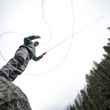

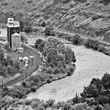














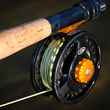
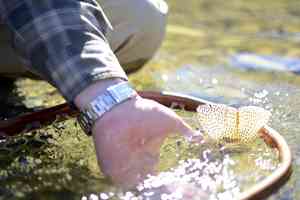
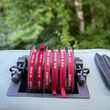


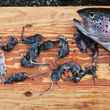



Comments